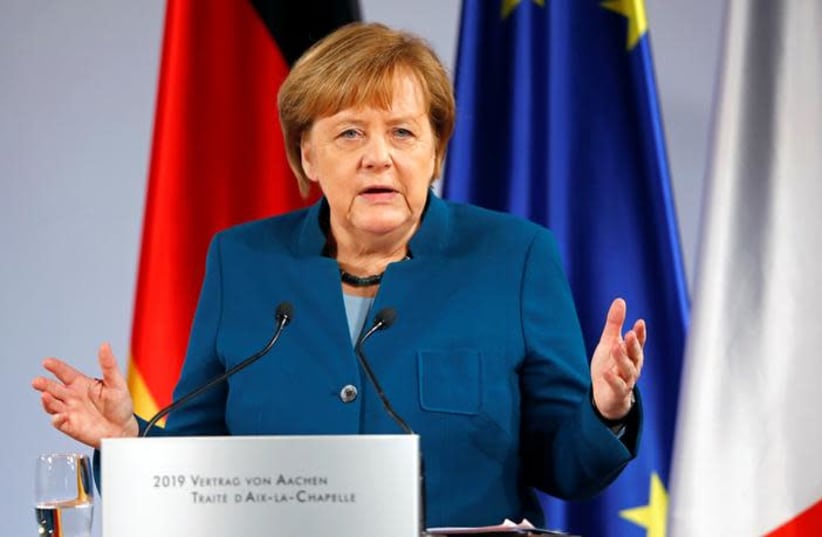Speaking at a panel discussion organized by Ostsee Zeitung local newspaper in the Baltic Sea town of Stralsund, Merkel said: “We said we want to achieve 1.5% by 2024. And that is our common will.”
In 2014, Merkel’s government committed her country's defense budget at a NATO conference in Wales to increase its expenditure to 2% by 2024. Her broken promise has created intense friction between the US and Germany.
US Ambassador to Germany Richard Grenell told Fox News on Wednesday: “The Wales Pledge was made in 2014 and it gave a 10-year runway to get to 2 percent by 2024.”
Sergio Gor, Deputy Chief of Staff to Senator Rand Paul, told The Jerusalem Post on Wednesday: "It’s highly concerning to Congress when German leaders prioritize giving foreign aid instead of meeting their defense spending obligations. Why should the United States taxpayer have to be liable when European nations are doing so little for their own defense? Ambassador Ric Grenell is absolutely right in raising this issue, and Washington is paying close attention to Berlin’s next step.”
A Reuters report on Wednesday said that the “Shrinking German economy [is] 'on [the] edge of recession' as exports stutter.” In response to the report, the US embassy to Berlin tweeted “Investment in the future is key – and where better to start than Germany’s Bundeswehr? 2 percent by 2024. NATO.” The Bundeswehr is Germany’s unified armed forces.
#Investment in the future is key – and where better to start than Germany’s #Bundeswehr? #2percentby2024 #NATO https://t.co/IMMySvcvjJ
— US-Botschaft Berlin (@usbotschaft) August 14, 2019
Christian Whiton, a former State Department senior advisor in Trump and George W. Bush administrations, told the Post that “Merkel’s posture is a joke and shows that the German government has no intention of doing its fair share for common defense. We ought to move our forces out of Germany and focus on collaboration with Poland the Baltics.”
He added that “Even if Germany were to spend the minimum 2% of GDP it promised on defense, which seems unlikely, there’s the question of what they would do with it. After all, they have opposed the US on Iran nuclear sanctions, and seem totally unwilling to help protect shipping in the Persian Gulf. They are a symbol of why NATO is obsolete and irrelevant to today’s threats.”
US President Donald Trump has repeatedly criticized Germany’s failure to raise defense spending to 2% of economic output as mandated by the NATO military alliance. Merkel said the current budget would see another increase in defense spending which would lift Germany’s level to 1.41% by 2020 according to recent economic growth projections. “And then we still have a lot of work to do for the next few years,” Merkel said. But she was convinced that Germany would meet its interim defense spending target of 1.5% target by 2024.The center-right leader pointed out that Germany was actually not violating NATO’s defense spending agreement because member countries agreed back then to lift defense spending “toward 2%”.“So this means in the direction of 2%, and we will continue to go in this direction also after 2024,” Merkel added.
Grenell said last week: “It is offensive to assume that the US taxpayers will continue to pay for more than 50,000 Americans [US troops] in Germany, but the Germans get to spend their surplus on domestic programs." The US along contributes 3.39 percent of its GDP to defense. Merkel's Germany gave out a mere 1.23 percent of its GDP on the military last year. In April, the prominent American journalist James Kirchick took Merkel's government to task in a Washington Post opinion article titled "Germany is NATO's biggest freeloader."
Only Britain, Poland, Greece ,Latvia, Lithuania and Estonia from the NATO alliance reached the 2% GDP defense goal outlined by NATO at the Wales conference. Germany is Europe's wealthiest country.
In July 2018, Trump said at a breakfast meeting in Brussels with NATO head Jens Stoltenberg: “Germany is totally controlled by Russia, because they will be getting from 60% to 70% of their energy from Russia, and a new pipeline, and you tell me if that’s appropriate, because I think it’s not and I think it’s a very bad thing for NATO.”
Thomas Jäger, a professor of international politics and foreign policy at the University of Cologne, recently told Focus magazine that Merkel’s perpetually oppositional policies to Trump are to blame for her “disastrous relationship” with the US president.
Jäger said that “On the other hand, the [German] federal government simply ignores the US’s long-standing demands to raise military spending in Germany to 2% of economic output. That too does not contribute to a de-escalation [in tensions between the countries’ leaders].”
Reuters contributed to this story.
